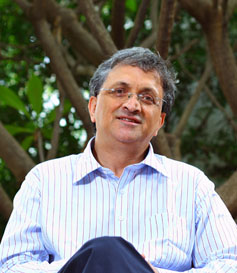Superstar culture afflicts BCCI, writes Ram Guha in resignation letter from panel
June 02, 2017 12:55

Historian Ramachandra Guha, appointed by the Supreme Court as one of the four administrators of the BCCI, on Thursday, informed the court that he had resigned from the post due to personal reasons.
A vacation bench of Justices M M Shantanagoudar and Deepak Gupta was informed by Guha's counsel that he had tendered his resignation on May 28 to Vinod Rai, Chairman of the Committee of Administrators of the Board of Control for Cricket in India.
In the strongly-worded letter, addressed to Rai, Guha expresses his displeasure about the way current coach Anil Kumble is being treated.
The way in which the contract of Anil Kumble, the current head coach of the senior team, has been handled. The Indian teams record this past season has been excellent; and even if the players garner the bulk of the credit, surely the head coach and his support staff also get some. In a system based on justice and merit, the head coachs term would have been extended. Instead, Kumble was left hanging, and then told the post would be re-advertised afresh, Guha wrote to Rai, quotes CricketNext which is in possession of the letter.
Guha also wrote on the CoAs failure to address a conflict of interest issue. He said national coaches have been neglecting the national team at the cost of IPL. He cites the instance of Delhi Daredevils coach Rahul Dravid who is also in charge of the India A and India Junior team. Guha points out that BCCI contracted commentator Sunil Gavaskar despite he being head of a player management company.
Guha lashes out at the 'superstar culture' in the BCCI writing: ... The superstar culture that afflicts the BCCI means that the more famous the player (former or present) the more leeway he is allowed in violating norms and procedures. (Dhoni was captain of the Indian team while holding a stake in a firm that represented some current India players.) This must stop and only we can stop it."
A vacation bench of Justices M M Shantanagoudar and Deepak Gupta was informed by Guha's counsel that he had tendered his resignation on May 28 to Vinod Rai, Chairman of the Committee of Administrators of the Board of Control for Cricket in India.
In the strongly-worded letter, addressed to Rai, Guha expresses his displeasure about the way current coach Anil Kumble is being treated.
The way in which the contract of Anil Kumble, the current head coach of the senior team, has been handled. The Indian teams record this past season has been excellent; and even if the players garner the bulk of the credit, surely the head coach and his support staff also get some. In a system based on justice and merit, the head coachs term would have been extended. Instead, Kumble was left hanging, and then told the post would be re-advertised afresh, Guha wrote to Rai, quotes CricketNext which is in possession of the letter.
Guha also wrote on the CoAs failure to address a conflict of interest issue. He said national coaches have been neglecting the national team at the cost of IPL. He cites the instance of Delhi Daredevils coach Rahul Dravid who is also in charge of the India A and India Junior team. Guha points out that BCCI contracted commentator Sunil Gavaskar despite he being head of a player management company.
Guha lashes out at the 'superstar culture' in the BCCI writing: ... The superstar culture that afflicts the BCCI means that the more famous the player (former or present) the more leeway he is allowed in violating norms and procedures. (Dhoni was captain of the Indian team while holding a stake in a firm that represented some current India players.) This must stop and only we can stop it."





 © 2024 Rediff.com -
© 2024 Rediff.com -